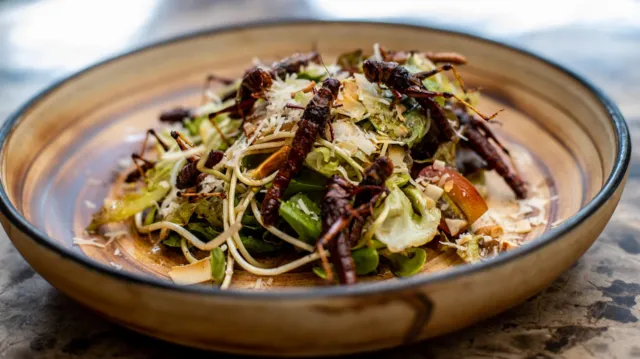
“Think of it as cricket cake, like fish cake,” the chef said as he urged the man in the buffet line to try the steaming, spicy laksa – a coconut noodle broth – full of “textured cricket protein”.
Next to it was a plate of chilli crickets, the bug version of a beloved Singaporean dish – stir-fried mud crabs doused in a rich, sweet chilli sauce.
It looked like any other buffet, except for the main ingredient in every dish: crickets.
The line included a woman who gingerly scooped stir-fried Korean glass noodles topped with minced crickets onto her plate, and a man who wouldn’t stop grilling the young chef.
You would have expected the diners to snap up the feast. After all, they were among more than 600 scientists, entrepreneurs and environmentalists from around the world who had descended on Singapore as part of a mission to make insects delicious. The name of the conference said it all – Insects to Feed the World.
And yet more of them were drawn to the buffet next to the insect-laden spread. It was the usual fare, some would have argued: wild-caught barramundi infused with lemongrass and lime, grilled sirloin steak with onion marmalade, a coconut vegetable curry.
Some two billion people, about a quarter of the world’s population, already eat insects as part of their everyday diet, according to the United Nations.
More people should join them, according to a growing tribe of bug advocates who champion insects as a healthy and green choice. But is the prospect of saving the planet enough to get people to sample their top creepy crawlies?
à la insects
“We have to focus on making them delicious,” said New York-based chef Joseph Yoon, who designed the cricket-laced menu for the conference, along with Singaporean chef Nicholas Low. The event had permission to use only crickets.
“The idea that insects are sustainable, dense with nutrients, can address food security, and so on,” is not enough to make them palatable, let alone appetising, he added.
Studies have found that crickets are high in protein. And rearing them required less water and land, compared with livestock.
Some countries have given insect diets a nudge, if not a push. Singapore recently approved 16 types of bugs, including crickets, silkworms, grasshoppers and honey bees, as food.
It is among a handful of countries, including the European Union, Australia, New Zealand, South Korea and Thailand, that are regulating what is still an incipient edible insects industry. Estimates vary from $400m to $1.4bn (£303m to £1.06bn).
 Weekly Bangla Mirror | Bangla Mirror, Bangladeshi news in UK, bangla mirror news
Weekly Bangla Mirror | Bangla Mirror, Bangladeshi news in UK, bangla mirror news







